Leon Karatsalos, co-founder of Gaia Winery, is a pioneer in the modern revival of Greek wine, with a vision that draws deeply from Ancient Greece’s rich viticultural history. Established in 1994 by Karatsalos and fellow winemaker Yiannis Paraskevopoulos, Gaia Winery has become a leader in elevating Greek wine on the global stage by blending ancient practices with contemporary innovation.
Ancient Greece was among the first civilizations to elevate winemaking into an art form, and wine was integral to daily life and ritual, symbolizing hospitality, community, and culture. This rich heritage is something Karatsalos and Gaia Winery aim to preserve while championing the unique terroirs and indigenous grape varieties of Greece, such as Assyrtiko from Santorini and Agiorgitiko from Nemea.
Karatsalos’s approach is emblematic of a broader movement in Greek viticulture, where winemakers are drawing inspiration from ancient practices to create wines that reflect both tradition and innovation. Grape Collective talks with Leon Karatsalos about his philosophy of viticulture and how the history of ancient Greece influences modern day winemaking in the region.
Christopher Barnes: Tell me a little bit about the history of Gaia.
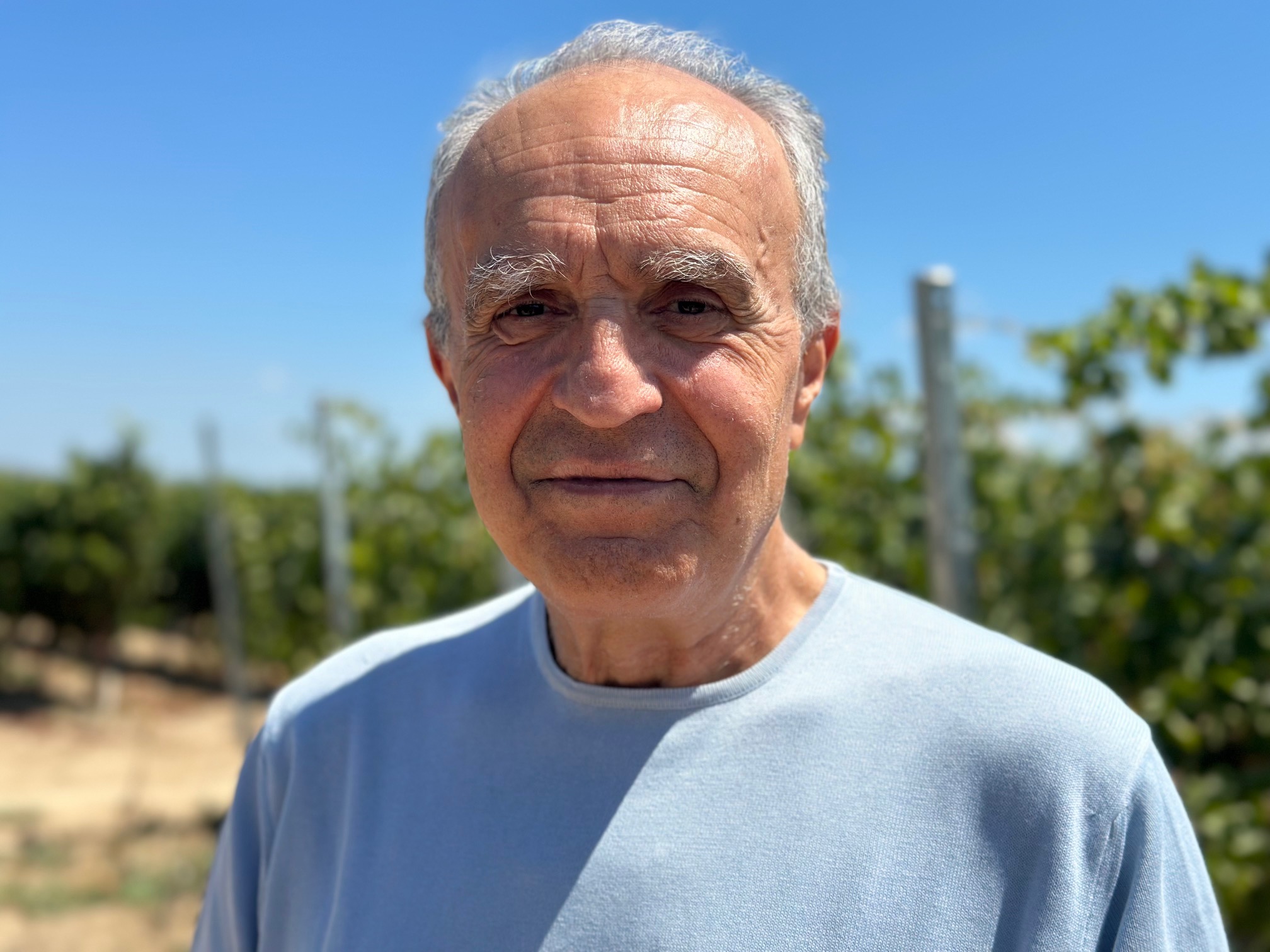 Leon Karatsalos: Gaia was established in ‘94. In fact, we started with just a few funds. My partner and I, who had, in drachmas, 1 million drachmas at that time, each one which is, let's say, €30,000. So we just rented a tank in Santorini from a traditional producer in Santorini. We produced Thalassitis Assyrtiko, which was the first brand name we released, and it was a great success.
Leon Karatsalos: Gaia was established in ‘94. In fact, we started with just a few funds. My partner and I, who had, in drachmas, 1 million drachmas at that time, each one which is, let's say, €30,000. So we just rented a tank in Santorini from a traditional producer in Santorini. We produced Thalassitis Assyrtiko, which was the first brand name we released, and it was a great success.
(Leon Karatsalos)
It was a very strange time at that time in Greece. It was ‘94, and new winemaking was coming. New small wineries had been built, and it was changing from huge, massive production wineries to small wineries with more identity and quality-focused wines.
So at that time in the market we had great success with Thalassitis. And then in two years, we came here to Nemea in the Peloponnese and bought land in the Koutsi village. It still is a very nice area which is a subregion of the Nemea region where Agiorgitiko is cultivated. And so in this way we had Thalassitis made in the winery, the traditional winery, to be sold so we’d have the income and support for the production. We started production in Nemea with Agiorgitiko in ‘97. So that was a very interesting and a very nice input in the Greek wine production. And the main idea for us was to be focused on indigenous grapes. So that's why we made those two choices.
We made the choice of Assyrtiko and of Agiorgitiko. We believe that those two grapes have the potential to spread around the world because they are really nice grapes with the potential of making great wines. The next 15 years, 20 years, we worked hard in this way. In this period, we had much more potential in the export than in the domestic market.
Finally, after 30 years, because now we're at 30 years of age, we have become more mature. We can say that the choice we made that time was really nice and correct. We now see Assyrtiko first and Agiorgitiko second, to be well known all around the world. And we were proud to say that we contributed a lot to help to make Assyrtiko and Agiorgitiko well known all around the world.
Talk a little bit about your philosophy of winemaking and viticulture at Gaia.
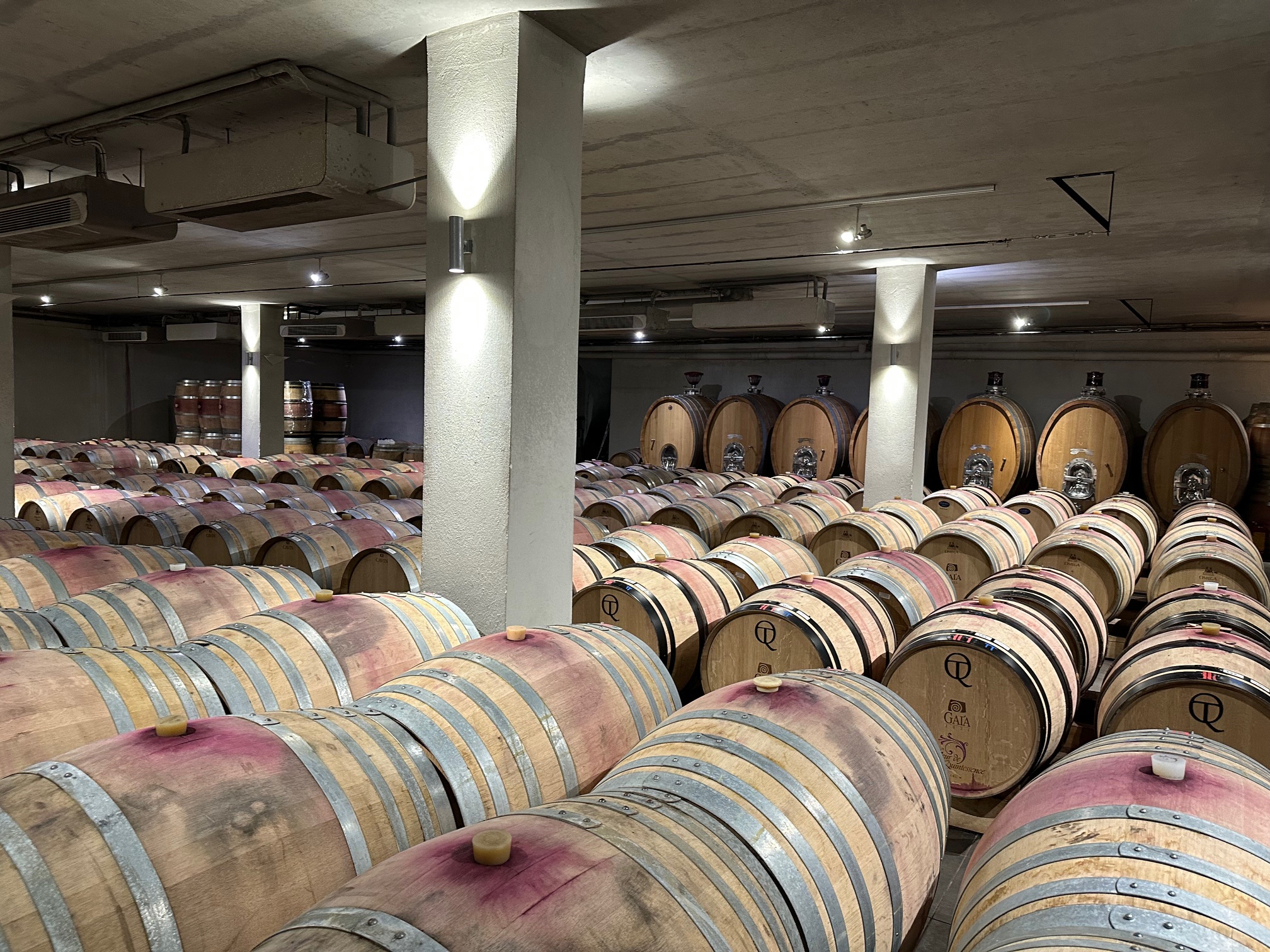 First of all, I will tell you that both of us, my partner and I, are agronomists. My partner is a winemaker too. So we have a general approach. We have the background to understand what's happening in nature. I have worked before in an agrochemical production company where we're producing and tasting a lot of biological (organic) products. So I've been involved in this production. And, according to my ideas, we do the best, without using any kind of insecticides or pesticides. So whenever there is the possibility to protect our grapes with biological products or organic products we do that. It doesn't matter how much it costs. We do that because it's important. We don't care about the cost. If the cost is a bit higher, we don't care about that. We care to have our grapes protected in the best way. And we try to avoid using any kind of insecticides or pesticides that can be dangerous for the health of the grapes and the health of the consumers and the health of the guys that are doing the spraying.
First of all, I will tell you that both of us, my partner and I, are agronomists. My partner is a winemaker too. So we have a general approach. We have the background to understand what's happening in nature. I have worked before in an agrochemical production company where we're producing and tasting a lot of biological (organic) products. So I've been involved in this production. And, according to my ideas, we do the best, without using any kind of insecticides or pesticides. So whenever there is the possibility to protect our grapes with biological products or organic products we do that. It doesn't matter how much it costs. We do that because it's important. We don't care about the cost. If the cost is a bit higher, we don't care about that. We care to have our grapes protected in the best way. And we try to avoid using any kind of insecticides or pesticides that can be dangerous for the health of the grapes and the health of the consumers and the health of the guys that are doing the spraying.
So we take care of a lot with that stuff. It's important for us. Unfortunately, there are some diseases like botrytis that there is no kind of protection without any use of chemicals. In this case, if we don't protect the Agiorgitiko grape, which is very sensitive to botrytis, if we do not protect them, we are going to lose the whole production. Because it's a business, we cannot do that. So we spray with chemicals in this case, which is once a year, close to the harvest. I'm saying, again, Agiorgitiko is very sensitive to these fungi, so this is what we're doing. All the rest is very well protected. You use much less fertilizer because the vines, they don't need it anyway. So this is our approach on the vineyards and the agriculture we're doing.
We own 20 hectares of grapes in the Koutsi area. We cultivate mainly Agiorgitiko and some Assyrtiko as well. You know Agiorgitiko has evolved a lot over the last years. So when we use clones of Agiorgitiko we'll have much more, much better grapes with these clones. We have 90% of Agiorgitiko, and 10% of Assyrtiko that we cultivate here. We have planted in the last five years a unique, forgotten variety called Vertzami. We do a nice red blend with it and Agiorgitiko which is something really special. And, I think it's something really unique for Greece.
You age some of your bottles underwater. Talk a little bit about that project.
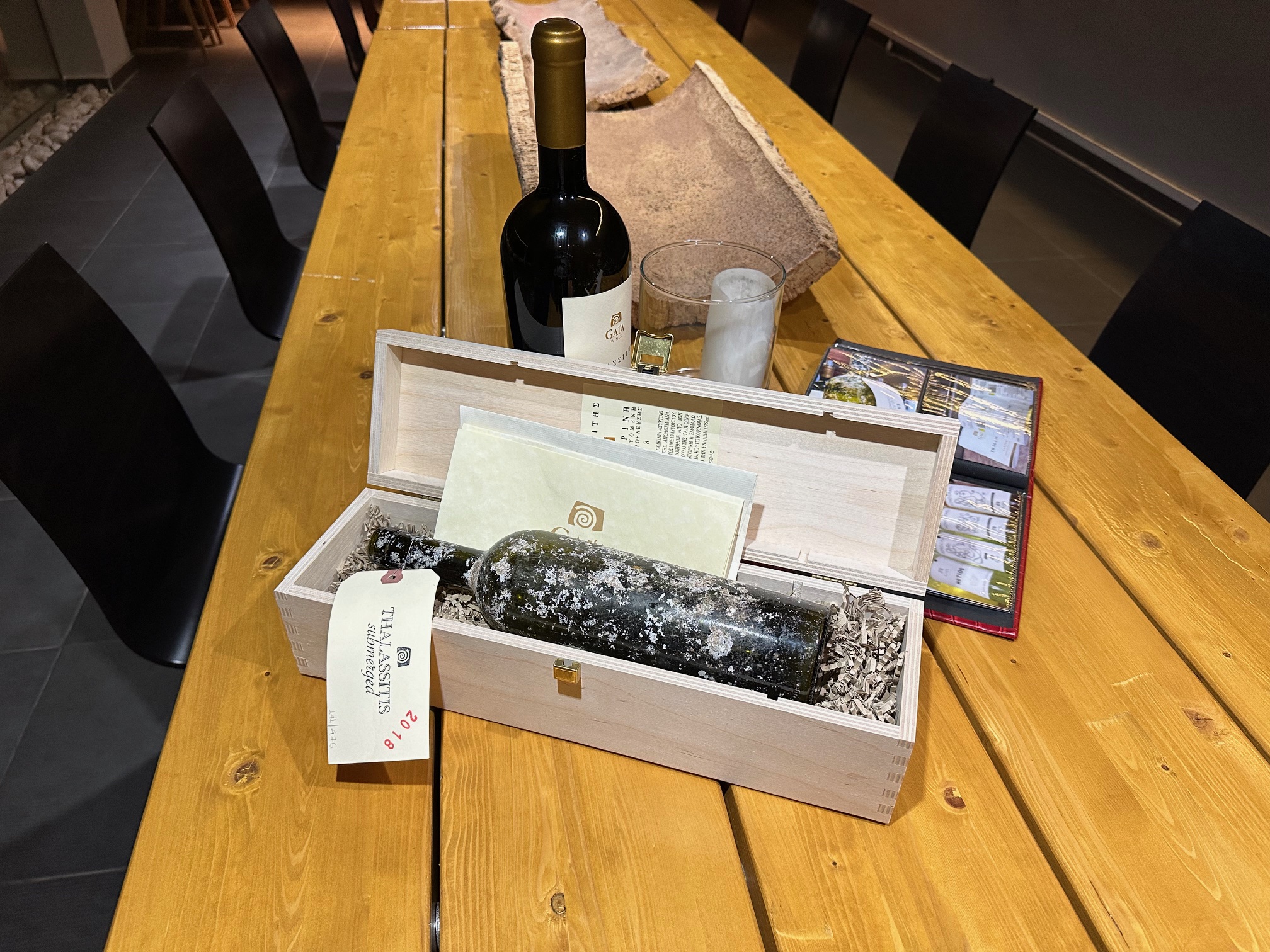 Our water-aged wine, we do that with Thalassitis, which is the first product we produced from Santorini. There has become a craziness with this wine. I think that it has supported a lot Thalassitis and the brand. People want to see how the wine evolves and ages under the sea. We do two things to see how, in general, it ages, because it's important for us to know. We built the history and we built the knowledge about the grapes and the varieties as we are really the first generation.
Our water-aged wine, we do that with Thalassitis, which is the first product we produced from Santorini. There has become a craziness with this wine. I think that it has supported a lot Thalassitis and the brand. People want to see how the wine evolves and ages under the sea. We do two things to see how, in general, it ages, because it's important for us to know. We built the history and we built the knowledge about the grapes and the varieties as we are really the first generation.
We need to do everything possible to learn and understand how the wines age and behave in time. This is the reason we submerged Thalassitis, and with the same bottles that we aged in the cellar in Nemea. We have done the comparison of aging the wines in the cellar and aging the wines under the sea and aging the wines in the normal temperature in Greece, which means, 28 to 30 degrees.
There's a huge difference between all those cases. We see that the wine that has been raised under the sea, the submerged wine, the balance of the change of temperature is different than the balance in the cellar, where the temperature is a stable 16 degrees. Under the sea, the temperature of the sea has been changing slowly and it takes time. It's a much more long-term procedure. And we see with the submerged wines that the aromas are a bit more round and fruity compared with the wines that have been aged in the cellar where the temperature is stable. The wines that have been aging in the stores and wine stores in Greece with temperatures of 28 degrees or 30 degrees are quite oxidized.
And this is a problem for Greece in general, because the wines are not stored in a very good condition. So this is important because Greece is not very well educated on this. So you can find in Mykonos, some in Santorini or in Crete, wines that are not stored well, which is not very good.
Talk a little bit about the Peloponnese, where we are right now.
Speaking about the Peloponnese, where the Gaia Nemea Winery is based, I will try to describe the territory of Greece and the terroir of Peloponnese. Greece is a very small country, and the Peloponnese is a peninsula in the south of Greece. It's a big peninsula in terms of the size of Greece.

If you go on the east side, you can see the sea, which means that the terroir is, I would say, continental, but it's not real continental because the scale is very small. So the sea affects the terroir, and the snow which is on the mountain affects the terroir at the same time. So at the end of the day, I would say it's something like mild continental or continental, but a bit mild continental, not the real continental. And trying to make it easier for you to understand, people who are living in the USA where California is on the same parallel with Greece, yes, we do have the same trees, olive trees, citrus trees or the same stuff in general, but there is a huge difference.
The huge difference is the scale of the ocean and the land. In Greece we don't have an ocean, we have a sea, and the sea is much smaller and the effect of the sea on the land, it's much more mild than the effect of ocean to the big land of California. So although it's the same parallel, it's different. So keep that in mind if you're thinking about Greece. Everything in Greece is on a small scale.
Greece is a mountainous country, and big mountains are like the Rockies in Colorado, starting from the north of Greece and ending at Crete. It’s like 85% to 80% of Greece is mountains. Although Greece is not well known because of the mountains, it's known because of the islands, because people come for vacation in Greece.
But the main thing is that Greece is a mountainous country, so the weather is especially adapted to the whole tradition around Greece. So Peloponnese is in the south, where our winery is, and the Peloponnese is a historic region, very beautiful landscape, really beautiful landscape. But I would say there's some similarities with Tuscany, you see, the nature is similar, the trees are similar, olive trees and Cypress trees and everything is very similar.
The landscape in the south of the Peloponnese where Sparta was based (Sparta being one of the biggest cities of the ancient period) is more similar to the south of Italy, Sicily, let's say. If you go to Sicily and go to the southern places of Greece, or the Peloponnese, you will see that there are similar villages and people have similar faces. They're dressed in a similar way. They behave in a similar way. What I'm saying is that the landscape and the region where each one lives affects the way one behaves and lives and understands everything. So nature is there and we are adapted to nature.
Athens is closer to us than Sparta in the south Peloponnese. It's one hour and a half drive from Nemea. It's the center of Greece and is the capital of Greece. It's a big city, I would say a big, dirty city, as the big cities are. But it's quite close to us. There are a lot of vineyards in the north part of Greece where there are different varieties cultivated, but in the south where we are, where we grow Agiorgitiko and it's the biggest wine region of Greece.
Give people a little bit of a flavor of the history of the Peloponnese.
 So speaking about Athens and the ancient period of Athens, everybody knows that democracy has been established in Athens. So the way we live, not in the same exact way, was made in Athens in 300 years BC. The same period will have Sparta, which was based on the south of Peloponnese. They were the two big cities and were always fighting each other.
So speaking about Athens and the ancient period of Athens, everybody knows that democracy has been established in Athens. So the way we live, not in the same exact way, was made in Athens in 300 years BC. The same period will have Sparta, which was based on the south of Peloponnese. They were the two big cities and were always fighting each other.
Athens was a democracy, Sparta had a more military way of thinking. And, their civilization was built on the power of men and the harshness of men. Women were there and they were important. But they were just only to support the healthy living of the fighters, which were the Spartan guys. You know, things were different.
Athens was more of a collective, everybody would say the ideal, though sometimes if we were honest about that we have seen a lot of people sent away from Athens because they have said something strange about the people in the government. But that was the creation of democracy at that time. So everything was different. Everybody knows that the creation of democracy in the Renaissance was based on the ideas of Athens in the ancient years. All of Western civilization has been based on the ideas of democracy, the ideas of Sophocles, Plato or Aristotle in ancient Greece. And thus this is a huge power that exists in Greece.
We made that in the past. But we need to be more focused and more powerful now and in the future, to become similar with the ancients, the people who were living here 3,000 years ago.
Can you describe the importance of wine in ancient Greece?
The truth is that it's really important that the ancient Greeks discovered wine and wine came from the eastern part of Mesopotamia where the first vineyards were cultivated. But the ancient Greeks found these vines and cultivated them in Greece. And as always they had a god responsible for the wine. This is the way that they were thinking, because these people at that time, they couldn't find any solution about who we are and what was going to happen to us when we die. So the Greeks found the grapes, discovered fermentation, which happened anyway through nature. It happens without any support. I mean, we do fermentation now with technology, but fermentation happens in nature, without any input from us.
So they see the wine made and they taste the wine and they see the reaction of the brain to the wine. So they found that it was really important to use the wine during the symposium and the dinners. They call it the symposium because it was taking such a long time and they were having so many different dishes. And the wine at that time was not the wine we have now. It was a bit different. We know very well that they were adding water to the wine because the wine without any facilities was more oxidized. So in a way, to be drinkable, they added water. The real word is “krasí,” the blend of the juice and the water. In some regions in the past, the more recent years, I mean, 15th century or 16th century, we have had some stories of people using seawater in the wine in order to use it as a medicine. But it's written sporadically in many places, in many books. We have found the main thing is that these guys discovered the use of the wine to make our heart smoother and lighter and change our feelings. And these guys discovered this 3,000 years ago, which is amazing.
Talk about the central place that wine had in people's lives in ancient Greece.
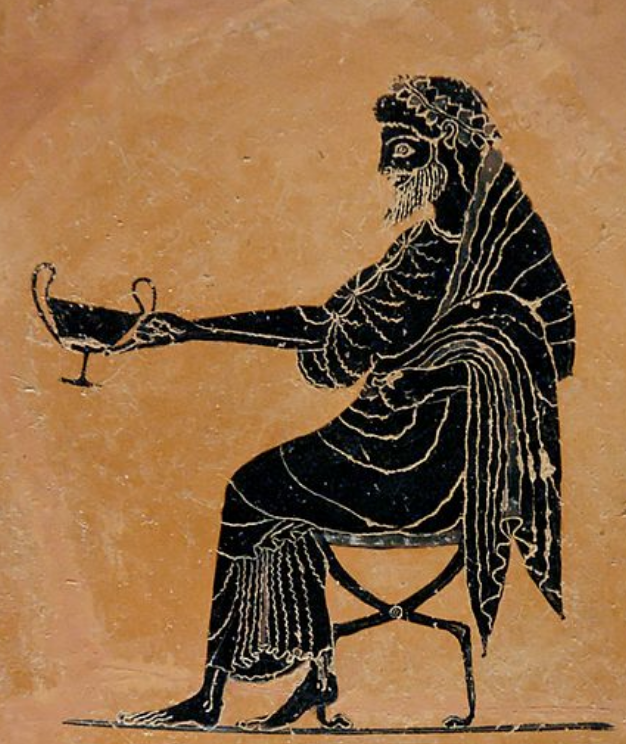 The Greeks were using gods. They have gods for everything. So rich is the mythology. We have been taught about mythology in early school and in high school. Trust me, it's not possible to learn everything. It's so complicated. Every idea, every problem in life, every thought about life has a God behind him.
The Greeks were using gods. They have gods for everything. So rich is the mythology. We have been taught about mythology in early school and in high school. Trust me, it's not possible to learn everything. It's so complicated. Every idea, every problem in life, every thought about life has a God behind him.
No matter if it was a big or lower case. God. Or there are different levels of God, they are not all the same. They are different. Many different, half gods, part gods. There's so many differences. There are people with lower levels of gods. So Dionysus was one of the big, important gods in the mythology.
(Dionysus extending a drinking cup)
Because they needed the answers. They needed to find excuses about their way of living. It was a hard time. It was not an easy time to live. Living was difficult. People were dying in their 40s, everything was different.
Children, about 60% to 70% of the time, were dead at birth. Women were dying during childbirth. There were no rich periods. Some periods were very good like the third century BC. In the ancient world there was a period when the artists were developing and building all these statues we see now. But Dionysus was anyway there all the time and supported good health and the good living of the ancient Greeks.
And Greece went through a little bit of a dark period with wine when under the control of the Ottomans.
After the Romans, Greece went through a dark period and was in a dark period for a long time. That came at 300 AD and then just until the independence which came up in the 18th century. So we're talking about 12 centuries, up to the 13th century, where the Eastern Roman country thrived. But Greece, the mainland of Greece for this period, was really abandoned. So it was a really rural place, producing some good cultural products and nothing else. So there was poverty everywhere. And that became worse after the Ottomans came to Greece and that Greece was a really poor country for a long period.
The Greek language and the Greek religion kept alive the feeling of a Greek mentality. It was, as I told you, 12 centuries. It was a dark period. It was a really dark period. That they were able to keep alive the Greek mentality and the Greek history and the Greek way of thinking which was a miracle after some big, huge period of darkness. The sense that religion and the language kept this feeling.
On the other hand, I know that the Greek civilization has been adopted by Western peoples. And the Renaissance used the main ideas of Greek authors and Greek philosophies. The Renaissance and the ideas of Renaissance were following the thinking of Aristotle or Plato or Socrates. Greek civilization was, I would say, the basis of Western civilization.
What I was saying is that it was a huge help for us to rediscover our identity and keep our identity alive after so many years. So in contemporary Greece, now you can see that we have an evolution, a huge evolution based on many ideas of the ancient Greeks, including the way wine was historically made by ancient Greeks. And we keep doing that now, using the old varieties, using ancient varieties, to make new trendy and nice wines.
The financial collapse, maybe just talk a little bit about the effects of that.
The financial collapse happened and after the crisis of 2008, it was a crisis all around Europe. Greek industry was affected a lot from this disaster. So, as you probably know, Greece was under crisis for not four or five or six years as it was for most European countries. It was under crisis for more than 15 years. So the crisis, in fact, in Greece, ended in about 2018, 2017. The most critical year was 2015, it was a political mess in Greece at that time.
But anyway, it's not a matter of why this crisis came to Greece for so long, the truth is that the sector of winemaking was affected a lot. We were happy that we were not so affected because we have a lot of exports. The domestic market was not so important for us at that time. We were not so affected by this damage as some other industries. And Greece has a lot of tourism, which helped a lot in the wine industry. Let's say that the wine industry was not as badly affected as other industries because of tourism and the exports.
Talk about the recent renaissance in Greek winemaking and the interest in international markets and Greek indigenous grapes.
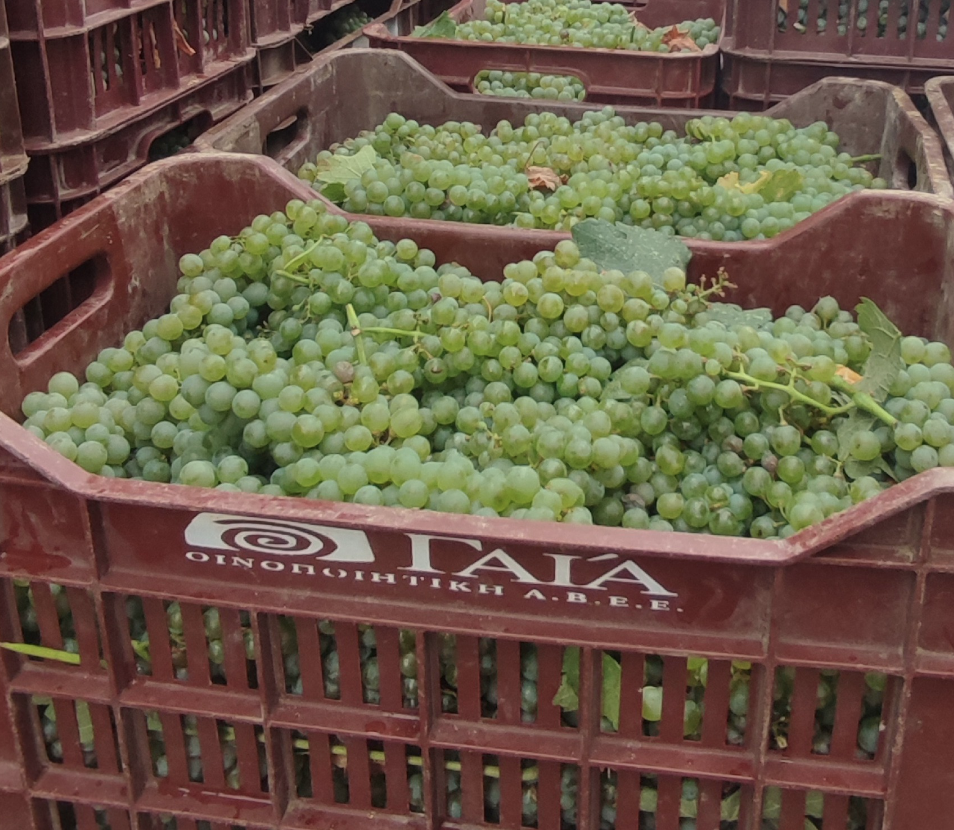 Yes indigenous grapes are our main aim. The international market is huge. There's a lot of wine all around the world. Huge production from many competitor countries like South America, Central Europe or Australia. So the idea of producing new varieties or indigenous Greek varieties was, I think, the only way to stay alive in this hard competitive market. Since this is a very small country, there are no huge vineyards to make the crop more price competitive. And, the properties here are very small. The wineries are all very small. Everything is small scale in Greece. So, we need to have an advantage based not only on the value for money and the competitiveness of huge wineries.
Yes indigenous grapes are our main aim. The international market is huge. There's a lot of wine all around the world. Huge production from many competitor countries like South America, Central Europe or Australia. So the idea of producing new varieties or indigenous Greek varieties was, I think, the only way to stay alive in this hard competitive market. Since this is a very small country, there are no huge vineyards to make the crop more price competitive. And, the properties here are very small. The wineries are all very small. Everything is small scale in Greece. So, we need to have an advantage based not only on the value for money and the competitiveness of huge wineries.
And this abundance is the diverse varieties we cultivate in Greece with completely different, diverse profiles. And, this profile is diverse because diverse is the terroir of Greece. All those things make us more positive about the future of winemaking in Greece.
Fifteen years ago you would go to a Michelin star restaurant and find maybe one Greek wine on the list if at all, but now it would be unusual to find a restaurant that was serious about wine that didn't have Greek wine on their list. Is that a fair statement?
The truth is that now the Greek wine has become, I would say, not a big competitor, but it is a kind of trend in brackets, I would say because of the Assyrtiko from Santorini. So starting from cities like New York where, you know, any new trend gets discovered. We did that in the late 1990s where we put our Thalassitis, the one from Santorini, in some trendy wine bars and restaurants. And people find the wine which was exotic at the time in the US, where people saw it as something really special. So now at this time we can find in most Michelin star restaurants, one or two Greek wines on their lists.
Most of them are Assyrtico, but you can see Agioritiko, you can see Xinomavro, you can see other varieties from Greece. And that happened because we worked hard all this time to promote and present the wines. And so now we can see we're in a good position in the national market, although we're small.
And last question, what are your hopes for the future of Greek wine?
I think the future of Greek wine is good. It's very good. I'm very positive about this because we have become more professional. So when we started there were just five or six wineries that were professional. And now we see a lot of wineries that have become professional doing wines to the international standards. The education about wine is also much better.
You see wine schools becoming more popular in Greece and wine courses are in the universities. The knowledge is much more and the way of living in Greece has become better and better. So you see that the GDP becomes bigger. As long as you have time to think and take care of more detailed things in life, wine is one of these. Wine is very good even for a bad situations, and it's very good for good situations. And good wine is important for our lives.














